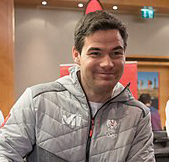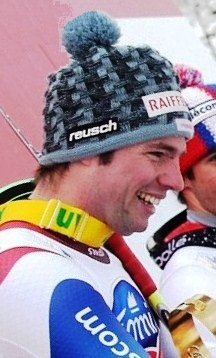
Aksel Lund Svindal is a Norwegian former World Cup alpine ski racer.

Kjetil Jansrud is a Norwegian former World Cup alpine ski racer and Olympic champion. He competed in all alpine disciplines apart from slalom, and his best event was the giant slalom where he has six World Cup podiums and an Olympic silver medal. Since 2012, he had concentrated on the speed events, where all but two of his World Cup victories had come. At the 2014 Winter Olympics in Sochi, he won the super-G and placed third in the downhill. At the World Championships in 2019 at Åre, Jansrud won gold in the downhill.

Matthias Mayer is an Austrian retired World Cup alpine ski racer and Olympic champion.

Aleksander Aamodt Kilde is a Norwegian World Cup alpine ski racer. He competes in four events, with a main focus on super-G and downhill. Kilde hails from Bærum and represents the sports club Lommedalens IL.

The International Ski Federation (FIS) Alpine Ski World Cup was the premier circuit for alpine skiing competition. The inaugural season launched in January 1967, and the 2018–19 season marks the 53rd consecutive year for the FIS World Cup.

The International Ski Federation (FIS) Alpine Ski World Cup, the premier circuit for alpine skiing competition, began in January 1967, and the 2019–20 season marked the 54th consecutive year for the FIS World Cup. As it had every year since 2006, the season began in Sölden, Austria in October. The season was supposed to end with the World Cup finals in March, which were to be held in Cortina d'Ampezzo, Italy for the first time since they began in 1993, but the finals were cancelled due to the COVID-19 outbreak in Italy.

The men's super-G in the 2021 FIS Alpine Skiing World Cup consisted of six events, although seven had been originally scheduled.

The men's downhill in the 2020 FIS Alpine Skiing World Cup consisted of nine events, with only one cancellation from the scheduled ten.

The men's super-G in the 2020 FIS Alpine Skiing World Cup involved six events, as the last two scheduled Super-Gs were canceled.

The men's slalom in the 2020 FIS Alpine Ski World Cup involved only nine events, as the final three scheduled slaloms of the season were cancelled.

The International Ski Federation (FIS) Alpine Ski World Cup was the premier circuit for alpine skiing competition. The inaugural season launched in January 1967, and the 2021–22 season marked the 56th consecutive year for the FIS World Cup.

The men's downhill in the 2022 FIS Alpine Skiing World Cup included eleven events including the final. A scheduled downhill on 5 December 2021 at Beaver Creek, Colorado was cancelled due to bad weather, but after several abortive attempts to run it at other venues, it was finally added to Kvitfjell on March 4, the day before the previously-scheduled race.

The men's super-G in the 2022 FIS Alpine Skiing World Cup consisted of seven events including the final. A race originally scheduled for Lake Louise in November and then rescheduled to Bormio in December was cancelled twice and was thought unlikely to be rescheduled, potentially reducing the season to six events. However, the race was rescheduled to Wengen on 13 January 2022. After this race, 2016 champion Aleksander Aamodt Kilde of Norway had won three of the five completed races and led the discipline; two other races were within 100 points of his lead, although no one was closer than 60 points behind. Kilde then clinched the discipline championship for the season in front of a home crowd by winning the next-to-last race of the season in Kvitfjell.

The men's super-G in the 2019 FIS Alpine Skiing World Cup involved seven events. Italian skier Dominik Paris seized the lead in the discipline from Vincent Kriechmayr of Austria by winning the next-to-last Super-G of the season in Kvitfjell, then won the crystal globe for the season by also winning the final in Soldeu, Andorra.

The men's downhill in the 2018 FIS Alpine Skiing World Cup involved nine events, including the season finale in Åre, Sweden. Swiss skier Beat Feuz ended the two-season reign of Italy's Peter Fill and won the season title in this discipline after a season-long battle with former discipline champion Aksel Lund Svindal of Norway.

The men's super-G in the 2018 FIS Alpine Skiing World Cup involved six events including the final in Åre, Sweden. Norwegian skier Kjetil Jansrud, the defending champion in the discipline, won two of the first five races and finished second in two more, clinching the crystal globe for the season before the final.

The men's downhill in the 2017 FIS Alpine Skiing World Cup involved eight events, including the season finale in Aspen, Colorado (USA). Due to difficult weather conditions, only two downhills were held during the first twenty events of the 2016-17 World Cup season, meaning that six were held during the final sixteen events. Defending discipline champion Peter Fill of Italy, who did not win a downhill all season, went into the finals trailing Norway's Kjetil Jansrud by 33 points, but he finished second in the finals while Jansrud finished 11th, thus permitting Fill to repeat as downhill season champion by 23 points despite not recording a win.

The men's super-G in the 2017 Alpine Skiing World Cup involved six events, including the finals in Aspen, Colorado (USA). Although Norwegian skier Aleksander Aamodt Kilde was the defending champion in the discipline, fellow Norwegian Kjetil Jansrud won the first three Super-G races of the season. With only six events in the discipline, Jansrud then clinched the season championship before the finals merely by finishing seventh in the fifth Super-G of the year in Kvitfjell, Norway.

The men's overall competition in the 2016 FIS Alpine Skiing World Cup involved 44 events in 5 disciplines: downhill (DH), Super-G (SG), giant slalom (GS), slalom (SL), and Alpine combined (AC). The newly introduced Parallel giant slalom event at Alta Badia, Italy—which was included in the giant slalom season standings—was a relatively short Giant slalom course that pitted the men against one another in a modified bracket-reduction format from a field of thirty-two qualifying skiers, eventually whittled down to just four final-round racers in a "large final" and a "small final".

The men's downhill competition in the 2016 FIS Alpine Skiing World Cup involved eleven events, including the season finale in St. Moritz, Switzerland.













